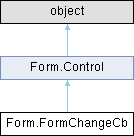|
IDAPython 9.0
|
|
IDAPython 9.0
|

Public Member Functions | |
| __init__ (self, handler) | |
| helper_cb (self, fid, p_fa) | |
| get_tag (self) | |
| free (self) | |
 Public Member Functions inherited from Form.Control Public Member Functions inherited from Form.Control | |
| get_arg (self) | |
| is_input_field (self) | |
Public Attributes | |
| handler = handler | |
| arg = _FORMCHGCB_T(self.helper_cb) | |
 Public Attributes inherited from Form.Control Public Attributes inherited from Form.Control | |
| int | id = 0 |
| input_field_index = None | |
| arg = None | |
| form = None | |
| bool | form_hasattr = False |
Form change handler. This can be thought of like a dialog procedure. Everytime a form action occurs, this handler will be called along with the control id. The programmer can then call various form actions accordingly: - EnableField - ShowField - MoveField - GetFieldValue - etc... Special control IDs: -1 (The form is initialized) and -2 (Ok has been clicked)
| __init__ | ( | self, | |
| handler ) |
Constructs the handler. @param handler: The handler (preferrably a member function of a class derived from the Form class).
Reimplemented from Form.Control.
| free | ( | self | ) |
Free the control
Reimplemented from Form.Control.
| get_tag | ( | self | ) |
Control tag character. One of Form.FT_XXXX.
The form class will expand the {} notation and replace them with the tags
Reimplemented from Form.Control.
| helper_cb | ( | self, | |
| fid, | |||
| p_fa ) |
| arg = _FORMCHGCB_T(self.helper_cb) |
| handler = handler |